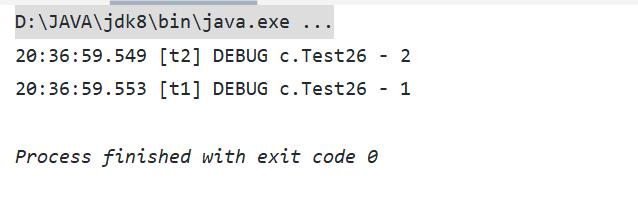JUC并发编程 多线程设计模式 -- 同步模式之顺序控制( 固定运行顺序 & 交替输出)
Posted Z && Y
tags:
篇首语:本文由小常识网(cha138.com)小编为大家整理,主要介绍了JUC并发编程 多线程设计模式 -- 同步模式之顺序控制( 固定运行顺序 & 交替输出)相关的知识,希望对你有一定的参考价值。
1. 固定运行顺序
比如,必须先 2 后 1 打印
1.1 示例代码01:
代码:
package tian;
import lombok.extern.slf4j.Slf4j;
@Slf4j(topic = "c.Test25")
public class Test25 {
static final Object lock = new Object();
// 表示 t2 是否运行过
static boolean t2runned = false;
public static void main(String[] args) {
Thread t1 = new Thread(() -> {
synchronized (lock) {
while (!t2runned) {
try {
lock.wait();
} catch (InterruptedException e) {
e.printStackTrace();
}
}
log.debug("1");
}
}, "t1");
Thread t2 = new Thread(() -> {
synchronized (lock) {
log.debug("2");
t2runned = true;
lock.notify();
}
}, "t2");
t1.start();
t2.start();
}
}
运行结果:

1.2 示例代码02:
代码:
package tian;
import lombok.extern.slf4j.Slf4j;
import java.util.concurrent.locks.LockSupport;
@Slf4j(topic = "c.Test26")
public class Test26 {
public static void main(String[] args) {
Thread t1 = new Thread(() -> {
LockSupport.park();
log.debug("1");
}, "t1");
t1.start();
new Thread(() -> {
log.debug("2");
LockSupport.unpark(t1);
}, "t2").start();
}
}
运行结果:

2. 交替输出
线程 1 输出 a 5 次,线程 2 输出 b 5 次,线程 3 输出 c 5 次。现在要求输出 abcabcabcabcabc 怎么实现
2.1 wait notify 版
示例代码:
package tian;
import lombok.extern.slf4j.Slf4j;
@Slf4j(topic = "c.Test27")
public class Test27 {
public static void main(String[] args) {
WaitNotify wn = new WaitNotify(1, 5);
new Thread(() -> {
wn.print("a", 1, 2);
}).start();
new Thread(() -> {
wn.print("b", 2, 3);
}).start();
new Thread(() -> {
wn.print("c", 3, 1);
}).start();
}
}
/*
输出内容 等待标记 下一个标记
a 1 2
b 2 3
c 3 1
*/
class WaitNotify {
// 打印 a 1 2
public void print(String str, int waitFlag, int nextFlag) {
for (int i = 0; i < loopNumber; i++) {
synchronized (this) {
while (flag != waitFlag) {
try {
this.wait();
} catch (InterruptedException e) {
e.printStackTrace();
}
}
System.out.print(str);
flag = nextFlag;
this.notifyAll();
}
}
}
// 等待标记
private int flag; // 2
// 循环次数
private final int loopNumber;
public WaitNotify(int flag, int loopNumber) {
this.flag = flag;
this.loopNumber = loopNumber;
}
}
运行结果:

2.2 ReentrantLock 条件变量版
代码:
package tian;
import java.util.concurrent.locks.Condition;
import java.util.concurrent.locks.ReentrantLock;
public class Test30 {
public static void main(String[] args) throws InterruptedException {
AwaitSignal awaitSignal = new AwaitSignal(5);
Condition a = awaitSignal.newCondition();
Condition b = awaitSignal.newCondition();
Condition c = awaitSignal.newCondition();
new Thread(() -> {
awaitSignal.print("a", a, b);
}).start();
new Thread(() -> {
awaitSignal.print("b", b, c);
}).start();
new Thread(() -> {
awaitSignal.print("c", c, a);
}).start();
// 睡眠1s先把线程启动
Thread.sleep(1000);
awaitSignal.lock();
System.out.println("开始...");
a.signal();// 唤醒a上的线程
awaitSignal.unlock(); // 释放锁
}
}
class AwaitSignal extends ReentrantLock {
private int loopNumber;
public AwaitSignal(int loopNumber) {
this.loopNumber = loopNumber;
}
// 参数1 打印内容, 参数2 进入哪一间休息室, 参数3 下一间休息室
public void print(String str, Condition current, Condition next) {
for (int i = 0; i < loopNumber; i++) {
lock();
try {
current.await();
System.out.print(str);
next.signal();
} catch (InterruptedException e) {
e.printStackTrace();
} finally {
unlock();
}
}
}
}
运行结果:

2.3 Park Unpark 版
代码:
package tian;
import lombok.extern.slf4j.Slf4j;
import java.util.concurrent.locks.LockSupport;
@Slf4j(topic = "c.Test31")
public class Test31 {
static Thread t1;
static Thread t2;
static Thread t3;
public static void main(String[] args) {
ParkUnpark pu = new ParkUnpark(5);
t1 = new Thread(() -> {
pu.print("a", t2);
});
t2 = new Thread(() -> {
pu.print("b", t3);
});
t3 = new Thread(() -> {
pu.print("c", t1);
});
t1.start();
t2.start();
t3.start();
LockSupport.unpark(t1);
}
}
class ParkUnpark {
public void print(String str, Thread next) {
for (int i = 0; i < loopNumber; i++) {
LockSupport.park();
System.out.print(str);
LockSupport.unpark(next);
}
}
private final int loopNumber;
public ParkUnpark(int loopNumber) {
this.loopNumber = loopNumber;
}
}
运行结果:

以上是关于JUC并发编程 多线程设计模式 -- 同步模式之顺序控制( 固定运行顺序 & 交替输出)的主要内容,如果未能解决你的问题,请参考以下文章